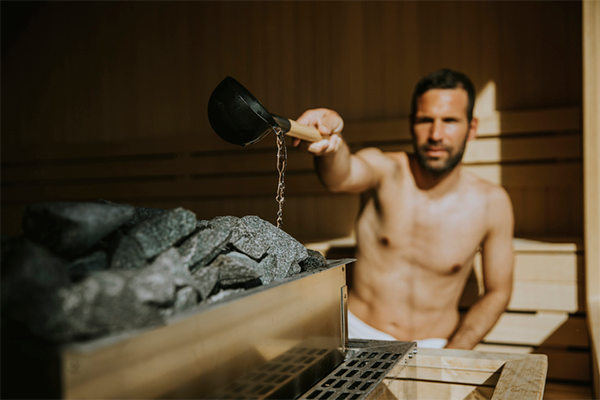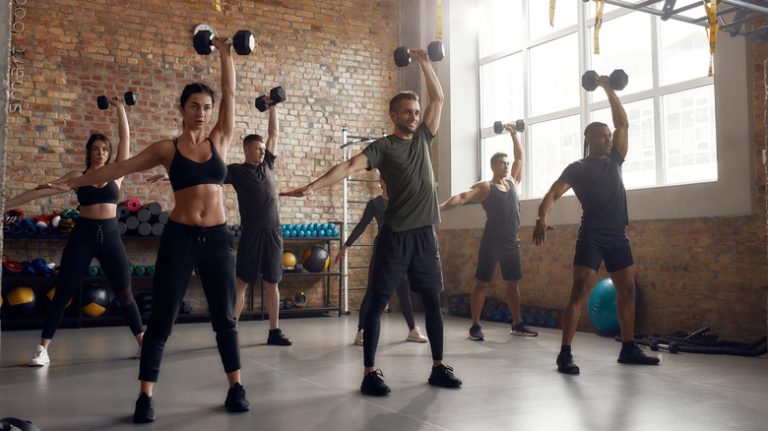Many cultures around the world love to hang out, relax, and work up a sweat in saunas and bathhouses. From the Turkish hammam and the Japanese sento to the Finnish sauna, research is catching up to this tradition, revealing the health-boosting benefits of a sauna routine. But for fitness purposes, is it better to use the sauna before or after a workout?
Here’s what you need to know.
Sauna Before or After a Workout: Which Is Better?
There are unique benefits of using the sauna either before or after your workout, so it largely comes down to preference and your fitness goals. However, hopping into a sauna after weightlifting might not be the best choice for post-workout recovery unless you have plenty of time between workouts, advises Jim White, RDN, ACSM Ex-P, owner of Jim White Fitness and Nutrition Studios.
He explains that one study found that a sauna session exhausted muscles more after weightlifting, increasing recovery time. So, if you don’t have 24 hours to wait between the sauna and your next lift, you may be better off saving the sauna for your rest day.
The Benefits of Using a Sauna Before a Workout
Spending time in the sauna pre-workout may improve your performance, but the research is far from conclusive on this.
If you want to try your hand at combining the two, make sure you’re well-hydrated beforehand.
1. May increase blood flow
Sauna sessions literally warm up the body.
The heat from a sauna “raises the body temperature and dilates blood vessels, leading to an increase in blood flow through the body,” White explains.
He adds that better blood circulation leads to improved delivery of nutrients and the removal of waste.
2. May improve exercise performance
The increased blood flow “can imply that sauna bathing before a workout session could improve the total performance of an individual,” White adds.
One study in which researchers exposed participants to the same conditions as a sauna found that they had better cardiovascular endurance and performance.
3. May decrease muscle soreness
It’s not uncommon for muscles to get sore after exercise, and many athletes swear by saunas for reducing that exercise-induced soreness, but the research supporting this benefit is limited.
One small study found that using a sauna before performing eccentric exercises led to less soreness and a smaller decrease in range of motion.
That study focused only on the wrist extensor muscles, however, so more research is needed before any broader, more definitive claims can be made.
In the meantime, you can can follow the athletes’ lead to see if it works for you.
The Benefits of Using a Sauna After a Workout
Apart from being a nice way to unwind and relax, there are plenty of benefits to using a sauna after working out.
1. May increase cardiovascular endurance
If you’re trying to increase your cardio endurance quickly, however, using a sauna after workouts may help.
A small study showed that male distance runners who hopped in a sauna three times a week after a workout for 30 minutes increased their time to exhaustion by 32 percent.
2. May help with acclimating to exercise in hotter temperatures
White explains that using a sauna after your workouts could help your body acclimate to higher temperatures and boost its ability to regulate internal temperature.
That can make it easier for you to tackle workouts in hot environments (like those running sessions during the summer).
How Long Should You Use a Sauna Before a Workout?

White suggests sticking with the American College of Sports Medicine suggestion of “no more than 10 minutes at one time, whether pre- or post-workout.”
But how well you’ve hydrated before your sauna session can affect the ideal amount of time for you.
If you know you’re dehydrated going on or start to feel lightheaded, end your session sooner.
It’s better to create a consistent routine of using the sauna for short bursts than lengthen your stay in the steam room.
There are potentially life-threatening complications to staying in a sauna too long.
“Extended exposure to high temperatures can result in heat exhaustion, heat stroke, and heart attack,” explains White.
And, no, marathon sauna stays aren’t going to help you lose weight. Weight loss isn’t really one of the sauna’s benefits since any change on the scale is due to water loss.
Keep to the suggested window and add more days per week if you want to increase your time in the sauna.
Should You Use a Sauna Whenever You Work Out?
There’s no need to use a sauna every time you work out.
“In studies with a positive relationship between sauna and exercise, individuals were placed in a regimen of three to five days a week,” explains White.
You may want to “follow the same schedule since there is already a blueprint that shows effective results from this frequency,” he adds.
Before you add regular sauna use into your fitness routine, though, you need to consult your health-care provider. People with certain health conditions may need to decrease their time in the sauna or avoid it altogether.
Your health-care provider can give you concrete suggestions based on your health and medical history.
But it’s not worth seeking out a sauna if you don’t have easy access to one already.
“Most of the research done in the area has been on elite athletes,” White points out.
That means we don’t know for sure that the benefits translate to people working out recreationally or to improve their health.








